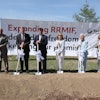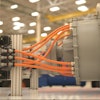TOKYO (AP) -- Major Japanese manufacturers are the gloomiest they've been in five years amid a deepening global slowdown, a key central bank report showed Wednesday.
The quarterly "tankan" survey by Bank of Japan offered a troubling snapshot of the world's second-largest economy: waning corporate sentiment, lower profit forecasts and a pullback in capital spending.
And with demand faltering overseas, Japanese companies were bracing for more turbulence in the months ahead.
The data "confirms that we are losing our forward momentum, and I think it's coming mostly from the fact that our exports are doing poorly," said Richard Koo, chief economist at Nomura Research Institute in Tokyo. "It has nothing to do with our products, but it's because the demand is falling in so many parts of the world."
The most-watched figure, the sentiment index for large manufacturers, fell for the fourth straight quarter to minus 3 in September, down from 5 in June. It was the first negative reading in five years. The figure represents the percentage of companies saying business conditions are good minus those saying conditions are bad.
The survey, which polls about 10,000 companies, showed that large companies downgraded their capital spending plans and now expect to increase expenditures by just 1.7 percent this fiscal year through March 2009 -- a bad sign since firms typically boost capital spending plans in autumn. In June's survey, managers had projected a 2.4 percent increase.
Big manufacturers forecast a 10.4 percent fall in fiscal-year profits, worse than a 9.9 percent decline they reported in June's survey.
"With the weakness of the economy and uncertainty in the future, we must carefully monitor (economic) developments from now," said chief government spokesman Takeo Kawamura, who reiterated the importance of passing and implementing the government's recently proposed economic stimulus package.
The tankan survey, which is taken to help Bank of Japan board members guide monetary policy, adds to already strong speculation that the central bank is likely to keep its key interest rate on hold at 0.5 percent for awhile. Its next policy-setting meeting is scheduled for Monday.
A day earlier, Tokyo released a triple dose of bad economic news suggesting further weakness. Household spending fell 4 percent in August, the jobless rate rose to a two-year high, and industrial production at the nation's vital manufacturers fell 3.5 percent.
Despite the grim figures, economists maintain that Japan's downturn is mild.
"It's getting worse, and the economy is definitely weakening," said Masamichi Adachi, senior economist at JPMorgan Securities in Tokyo. "But it's not collapsing."
Indeed, business conditions in September looked far brighter than lows hit during Japan's previous recession, when the large manufacturers' index plunged to minus 51 in December 1998.
Inflationary pressures also appear to have eased, with confidence even rising in some sectors, such as iron and steel, which benefited from lower oil and material prices.
The Japanese economy "is deteriorating for sure but there are some bright elements such as material manufacturers who are raising their margins," said Takuji Okubo, senior economist at Merrill Lynch in Tokyo. "Except for that, the Japanese economy is following the world trend to a certain extent."
The decline in confidence was broad-based, hitting small- and medium-size firms especially hard.
The index for major non-manufacturers' confidence stood at 1, deteriorating from 10 three months earlier, the tankan showed.
Conditions reported by small manufacturers tumbled to minus 17, while those for small non-manufacturers' hit minus 24.
The sentiment index for big manufacturers is forecast to drop to minus 4 in September, while the figure for large non-manufacturers will likely fall to minus 1.
Managers also said they expect an average dollar value of 102.82 yen during the fiscal year, slightly higher than their previous estimate of 102.74 yen.






















